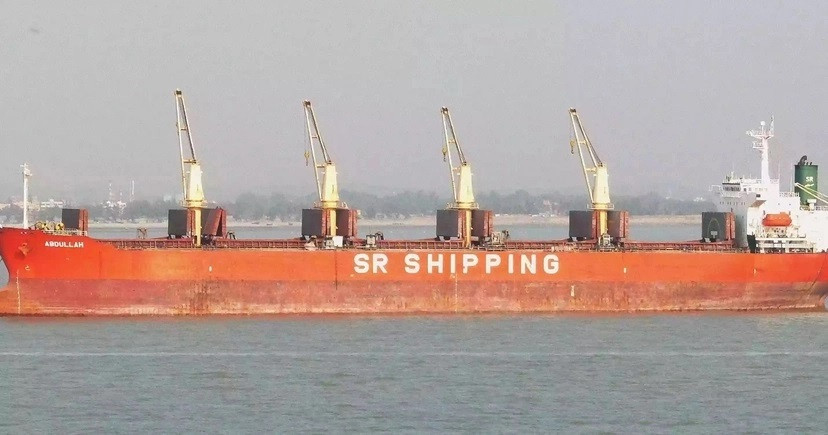
Hijacked vessel MV Abdullah. Photo: Collected
That MV Abdullah has been seized by pirates 450 nautical miles off the coast of Somalia on its way to the UAE from Mozambique carrying coal is a vexing problem for Bangladesh.
Piracy on the coast of Somalia was once a common occurrence in the Arabian Sea. Ships from at least 40 countries, including America, Britain, Netherlands, France, China, Portugal and Greece, were hijacked from here. From 2005 to 2011, a ransom of about 400 million dollars was collected here, according to the World Bank.
That is why, since 2011, patrol ships have been deployed on this coast under the supervision of the United Nations. Due to no ship hijackings and a sharp decline in attacks on fishing boats since 2017, the International Maritime Organisation (ICC IMB) last year declared Somalia’s coast off its list of high-risk areas.
The ongoing Israeli war on Gaza has aggravated the security condition of the Somali peninsula known as the Horn of Africa. Yemen’s Houthis have warned that they would target all ships, regardless of their nationality, that are bound for Israel.
They have also warned all international shipping companies against dealing with Israeli ports. The Yemen government is attacking Israeli and Israeli-bound ships in the Arabian Sea to protest Israel’s massacre of Palestinian people and occupation of Palestinian territories.
The United States has also allocated budgets to counter the attack in Yemen and to secure Israeli-bound ships off the coast of Somalia. Mention may be made here that Yemen and Somalia control a large part of the Gulf of Aden in the Arabian Sea and the U.S. is hell-bent on establishing its hegemonic control over everybody. The poor Bangladeshi sailors are the victims of the U.S. political and military hegemony in Somalia.
The resolution passed by the UN Security Council on December 3, 2021 states that since the Somali coast is safe, UN activities will be gradually reduced from here. But then again, the presence of UN ships in the region has been made essential to ensure the supplies to Israel after Israel invades Palestine and to ensure the security of one of Israel’s allies, Saudi Arabia.
The incident of hijacking the Bangladeshi ship brought that opportunity for America, a longtime friend of both Israel and Saudi Arabia. The opportunity has been created to enlist the coast as a high-risk area that has been stable for seven years.
Just as the U.S. media has portrayed Yemen’s UN-recognised government as Hutu rebels, it serves U.S. interests to portray the Somali coast as vulnerable. As a matter of fact, after Somali piracy has steadily weakened since 2011, the UN patrols began in full swing. This is evidenced by the fact that not a single ship has been hijacked in the last seven years.
According to a BBC report, Somali pirates are mainly former officers of the Somali army and navy and some technical personnel.
There were no job opportunities for them in war-torn Somalia. By rehabilitating them, the region has been freed from piracy. The sailors of Bangladeshi ships held hostage in Somalia waters are believed to be held captive by these former military officers.
But the matter has not yet been authenticated by hard facts. In addition to the United Nations, a total of eight countries’ navies, including the European Union, NATO and five permanent members of the United Nations Security Council, are patrolling here. How Bangladeshi ships fell under the hands of pirates in such security is a question.
However, the most important thing for Bangladesh at the moment is the safety of the 23 hostage sailors and their safe return to the country. International circles have been contacted through the Ministry of Foreign Affairs to work out a realistic solution to the problem. Since the hostage soldiers are still alive, the government should take the earliest possible opportunity to rescue them.
The way the other countries are used to applying to rescue ships and sailors may well apply to the way Bangladesh should take. The government is taking all necessary steps to free the ship and the hostage sailors through the Protection and Identity (P&I) Club. However, it cannot be made public for security reasons what process they are going through.
The government is very optimistic about their success in rescuing the sailors because back in 2010 they had released another ship from the same company that took them long 100 days. Generally, insurance authorities do the negotiation work in these cases. The Bangladeshi ship was also insured. They have started a communication process with intermediary institutions to talk about ransom and other issues.
The U.S. seems to have waged a war of nerves on Bangladesh and the man-made troubles Bangladesh is running into at this moment in time may be instigated by the recent deterioration in relations between the two countries.
___________________________________________________
The writer is a former Vice Chancellor of Islamic University Bangladesh

